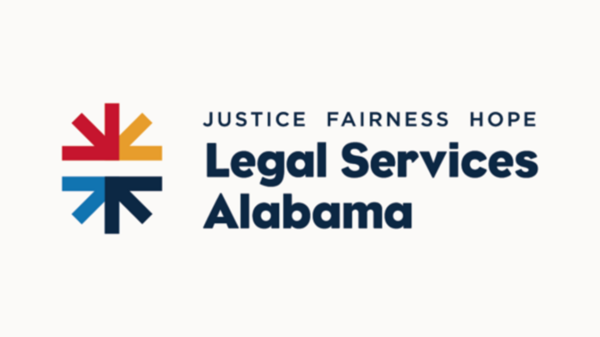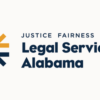In Alabama, where nearly 30 percent of residents live at or below the federal poverty line, access to affordable civil legal aid remains scarce. With the state providing no public funding for civil legal assistance, much of the burden falls on organizations like the state’s five Volunteer Lawyers Programs, which quietly serve as essential pillars of justice for low-income residents.
Montgomery Volunteer Lawyers Program, which began in 2012, is a prime example of how these programs are helping fill the gap in services. In 2023, MVLP alone opened over 1,000 civil legal aid cases in Montgomery County and closed more than 900, handling everything from evictions to custody battles.
The VLPs are hyper-local nonprofits—five total, located in Montgomery, Madison, Birmingham, South Alabama, and one run by the Alabama State Bar that serves the remaining 62 counties. Each operates independently but works cooperatively.
“We’re more boots on the ground,” said Peyton Faulk, executive director at Montgomery Volunteer Lawyers Program. “We’re in every civil courtroom in Montgomery County. We’re in the churches, the neighborhoods. People know if you show up to court, we’re there.”
This hands-on, community-based model has had tangible results. Judges and even opposing attorneys in Montgomery now seek out VLP volunteers, recognizing the benefits of equitable legal representation for all sides.
While Legal Services Alabama does provide a portion of funding, around 15 percent for the Montgomery VLP, most of the program’s financial support comes from private donors, local businesses and grantmaking organizations like the Alabama Law Foundation and the Alabama Civil Justice Foundation. The Alabama Law Foundation administers funds from attorney-held trust accounts, known as IOLTA, Interest on Lawyers’ Trust Accounts, which help support civil legal aid statewide.
The VLPs are also collaborating more than ever. In 2023, the five programs and LSA formed the Alabama Pro Bono Alliance to pool resources, share grant writers and jointly pursue funding opportunities. This coordination, especially in a state that contributes zero dollars in its budget to civil legal aid, is vital.
“There’s enough need that even all of us together can’t meet it. We’re the only lawyers trying to work ourselves out of a job. Unfortunately, that’s not going to happen anytime soon,” said McTear.
The VLPs’ efforts serve Alabama’s most vulnerable residents, predominantly single working mothers, the elderly and individuals living paycheck to paycheck who don’t qualify for traditional aid but can’t afford private counsel either.
Despite their impact, the future is uncertain. Federal attempts to defund LSA have intensified, and many fear the public doesn’t fully understand how integral these programs are, or that VLPs exist at all.
“We don’t want people to believe that if LSA goes away, there’s no help,” said McTear. “But we also want funders and the public to know that we’re here, we’re working and we need support.”
The MVLP currently has around 85 active volunteers and hopes to double that number. In a state where legal deserts still exist and some counties have only a handful of practicing attorneys, the role of VLPs in cities like Montgomery is all the more vital.
“Desperate people do desperate things. But if we can help them see a path forward—even just a plan—that changes everything,” said McTear.
Glory McLaughlin, the executive director at the Birmingham Volunteer Lawyers Program, described the organization’s work as “critical legal triage for those most in need.” Like its counterparts in Montgomery and elsewhere, BVLP provides civil legal assistance to low-income residents in Jefferson County.
“We see a lot of family law and housing issues, but also wage garnishments and collections,” McLaughlin said. “We also have clinics for estate planning and expungements, and that last category has ballooned into something we’re really struggling to keep up with.”
McLaughlin emphasized that BVLP’s model relies heavily on short-term legal interventions through “help desks” and legal clinics with volunteer attorneys.
“We get volunteers from big firms, small firms, solo practitioners, even semi-retired lawyers. Support really comes from all corners of the legal community,” said McLaughlin.
BVLP is largely funded by the Alabama Law Foundation, which administers IOLTA funds. “That’s about half our budget now,” McLaughlin noted. “Another 25 percent or so comes from law firm donations, and the rest from smaller grants and individual gifts.” A $70,000 federal subgrant via Legal Services Alabama, funded through the Legal Services Corporation, also helps, but McLaughlin acknowledged that their organization wouldn’t be dismantled if that grant disappeared.
Still, LSA’s struggles would directly impact VLPs.
“If LSA ceased to exist or became very small, the number of people needing our services would increase dramatically—and I don’t know what we’d do with that,” McLaughlin said. “We’d have to start triaging even more than we do now.”

















































